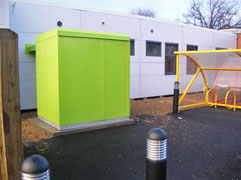Ground Source Heat Pump – Running costs
A well designed ground source heat pump system provides the lowest running cost of any heating system – because it uses a small amount of electricity to transfer a large amount of naturally occurring heat from the ground into your building.
The benefits of using a GSHP are that you can:
- enjoy lower fuel bills
- eliminate the need for fuel deliveries
- reduce your carbon emissions
- reduce your annual maintenance costs
- earn significant income from the Renewable Heat Incentive
- install a safe, silent, invisible heating system with no planning restrictions

Ground Source Heat Pump – Installation costs
The investment in a GSHP system will cost more than for a traditional fossil fuel boiler because you need to install a ground loop to allow heat exchange with the ground. The piping for the ground heat exchanger may be installed in horizontal trenches if space is available or in vertical boreholes if larger capacity is required from a smaller surface area. The investment in the ground loop is a large part of the cost of installing a GSHP system but should last for 100 years: this contact with the ground enables the GSHP to transfer and concentrate a large amount of heat from the ground into your building.
If you install a GSHP system into an existing building you may need to upgrade the heat emitter system within the building. A GSHP is very efficient at delivering warm temperatures (50°C) to underfloor heating or air handling systems but is less efficient at delivering the higher temperatures needed (70°C) by undersized radiators.
Although a GSHP installation will have a higher initial cost than a traditional heating system this is taken into account in the RHI which is earned over the first 20 years of use of a commercial system, and over the first 7 years of a domestic installation.
You may be able to make savings in the installation cost of GSHP system if you invest in improving the insulation of your property. This will not only reduce the running cost of your heating system, but may also reduce the capital cost if the capacity of the heat pump, or the size of the ground loop, can be reduced in line with the reduced heating load.
Ground Source Heat Pump Installation Costs – Important Questions
The cost of a ground source heat pump installation is an important question. However, the more important question relates to the quality of the design and installation.
A cheaper installation is not a better installation unless it performs well over a long life – a ground source heat pump installation is not a commodity item.
Your initial concerns should be focussed on:
- the experience of the gshp installation designer
- the quality of the installation of the ground heat exchanger
- whether the capacity of the gshp is well matched to the heating load (and cooling load) of the building
- whether the gshp installation is well matched to the heat distribution system in the building
- the coefficient of performance expected from the installation
- whether the installer is offering to maintain the system, with performance guarantees.
Ground source heat pump "whole of life" costs
If you can get a satisfactory answer to these enquiries then cost becomes a consideration. Beware that if you address questions of cost before quality there are many short cuts that an installer can take to reduce his costs. These include:
- using cheaper materials for the ground heat exchanger
- providing a smaller ground heat exchanger than is required to achieve a low running cost over an extended period
- failure to take time to understand the detailed parameters of the building and perform a full thermal model to inform the optimum design for the installation
- failure to co-ordinate the main components of the installation (ground heat exchanger, ground source heat pump, controls, and heat distribution circuits).
A well-designed gshp installation has many enduring advantages including a lifetime of service at low running costs from an automated system that runs itself and a low "whole of life" cost.
Beware of going for a "cheap" option! Above all do not compromise on design costs.
See also Ground source heat pumps.
Control Systems for Ground Source Heat Pumps
A good control system is important in achieving good results from ground source energy. The controls are critical if a building employs ground source energy in conjunction with other forms of heating which may be employed for generating domestic hot water or as a supplementary heating system in very cold weather.
Contact ICAX
We prefer to work in conjunction with architects and M&E consultants from the earliest stage to ensure that there is a clear understanding of how we can help to deliver a sustainable building with a high carbon offset.
Please email enquiries to
or give us a ring on 020 7253 2240.
Ground Source Heating Ground Source Cooling Ground Source Energy
See also: Ground Source Heat Pumps | Banking on IHT
See also: Seasonal Thermal Energy Storage




